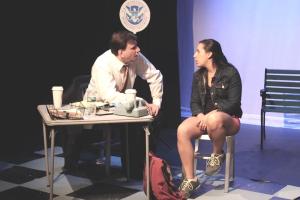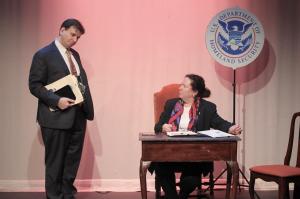Debriefing The Director

Joan Kane
It’s NYFringe time again, and Joan Kane, Artistic Director of Ego Actus, is storming the stage with a new work, “Debriefing” by Maximillian Singh Gill, that brings a unique look into a war we thought we knew everything about. “Debriefing” has only 3 performances left, so click here for tickets!
This interview with Joan focuses mostly on her current gig, but you can read more about her as a director in our interview, located here.
CP: Welcome Joan! As one of the busiest people I know in our community, I appreciate you taking the time to chat with us. Let’s jump right in! How did you first get connected with Debriefing?
JK: As a free-lance director, in past years, I have directed plays for White Rabbit Productions. I met the playwright, Max Gill who is a member of White Rabbit, last year while directing his short play, The Trouble With Mustard Greens. I read Debriefing and was hooked. I wanted to tell this story.

CP: Debriefing is about a young Pakistani–American activist who is recruited to infiltrate a militant group in Syria, and then disappears. The topicality is obvious. How often have you found inspiration / information from contemporary news?
JK: Unfortunately there is many sources of information that we were able to draw upon as research before and during rehearsals. Directing is not an easy task but directing a play about contemporary issues can be daunting. In my research I felt like I was living in the imaginary world of beheadings, drone strikes, and Homeland Security infiltrating ISIS while real world headlines barked mirror images. This was very scary. I found myself shutting out the headlines in order to be able to go to rehearsal in the evenings. I could only work on a monologue by Finch (Page Clements) about a man’s head slowly being sawed off or an explanation by Aliya (Nazli Sarpkaya) of a woman’s death due to an American drone strike if my head was clear and focused. Many discussions with the cast and designers helped to make the story come alive on stage. By shutting out the contemporary news I was able to be objective and tell the story Max had written. In this case the headlines were a burden instead of an inspiration.
CP: What would you like for your audience to take away with them, after seeing this play?
JK: War is a complicated series of conflicts and the hardest and most difficult thing for an individual on either side to do is to maintain their basic humanity. Each character Reed (Andrew Rothkin), Finch (Page Clements) Aliya (Nazli Sarpkaya) and Waleed (Adeel Ahmed) struggle with staying true to their assignments or going beyond duty and helping to relieve the suffering of the humans brutalized by the effects of war. The big question is how does one maintain loyalty to one’s country while still maintaining empathy for the “other.”

(fr. l to r) Nazli Sarpkaya and Adeel Ahmed (photo by Bruce A! Kraemer)
CP: Your company Ego Actus, along with White Rabbit Productions, is producing this play at The New York Fringe Festival. The NY Fringe is one of the oldest and most respected festivals around. Are you looking forward to putting your work in front of their audiences?
JK: I adore The NY Fringe! It has been an excellent experience. We are honored to be participating in the 20th NYFringe. Everyone is friendly, well organized and willing to help with problems. So far our audiences have been attentive and receptive. Unlike other New York festivals, The NYFringe provides a lounge where audience and artists can discuss the show. For me this is what makes a truly valuable festival experience, audiences intermingling with artists and discussing the art they just experienced and created.
CP: You have a lot of experience directing for festivals – Midtown International Fringe, United Solo, NY Fringe, Prague Fringe and the grandmother of them all, Edinburgh Fringe. What advice would you give a fellow director about directing in a festival?
JK: KISS! Keep It Simple! Minimal scenic elements, props and technical aspects of production in general. Whatever you do you typically get 15 minutes to put your show into the theatre, including the audience walking in, and 15 minutes to load your show out. Your show cannot play longer than you agree to with the festival. Simple is the key to success. In terms of the type of show to present I’d advise a company to pick a script by a new author or a new concept of an old script. Festivals can be loads of fun. Take risks and be creative. I have found that the limitations of time, space and materials have forced me to be truly creative and I have produced some of my best work as a director in festivals. In Debriefing, the design elements are specific yet simple, Lytza Colon’s set suggests locations with pieces of furniture and floor coverings. Jacob Sobotnik’s sound scape created 5 different locations with specific lighting designed on a festival plot by Bruce Kraemer. Cat Fisher’s costumes helped the flow of time with a change of a scarf and an addition of a jacket and tie in specific scenes. Every element was simple yet these elements were unified to tell this story. I found this a welcoming challenge.

(fr. l to r) Andrew Rothkin and Nazli Sarpkaya (photo by Bruce A! Kraemer)
CP: Tell us a little bit about directing in other countries. What are some of the key differences / similarities you’ve seen between working here versus overseas?
JK: One of the key differences in working in other countries is that you have to budget for travel and lodging. In Edinburgh, for instance, the prices of air flights and various housing options are bumped up for the festival. Another difference in Edinburgh is that there are way too many shows and audiences are stretched very thin. There is a similar problem in Prague for a different reason, there are only a certain amount of English speaking people to make up the audiences. Another big difference is that ticket prices in Europe are very low, compared to here. That makes it difficult to make any of your money back. Similarities include that audiences want a well-developed play that is entertaining and tells a story that is worth their time. Both here and there your show is playing in an interesting city, so whatever you do to promote your show has to be attractive and inventive.
CP: What do you do, or where do you go, to re-charge your creative battery?
JK: I walk the High Line Park in Chelsea, hug a tree in my backyard and go to museums to explore the different collections: fine art, historical, botanical, science, and contemporary. For the past year I have been wandering the galleries of the MOMA, Brooklyn Museum, NY Historical Society, Metropolitan, Museum of the City of NY and Brooklyn Botanical Gardens due to my membership in the NYC Identification Program. I highly recommend that folks obtain this card. Because of this program I wander the galleries rain or shine for free! Seeing all the work of past and contemporary artists puts into perspective that the life of an artist is more than a painting or one show but the collection of a life time of creativity. I’m reminded that the life of an artist is exactly that – a life that spans decades, decades of creativity.

(fr. l to r) Andrew Rothkin and Page Clements (photo by Bruce A! Kraemer)
CP: How does having your own company, Ego Actus influence your work as a director?
JK: I am fortunate that I have complete freedom to direct a script in a festival or in a stand alone production. Unlike many theatre companies, Ego Actus does not have a board of directors so we do not have anyone trying to exert control over what projects we do or don’t do. I have the ability to choose scripts and tell stories that I am most passionate about.
CP: Thank you so much for telling us more about your latest project, and about directing for NYFringe. Here’s wishing you and your team many broken legs!

